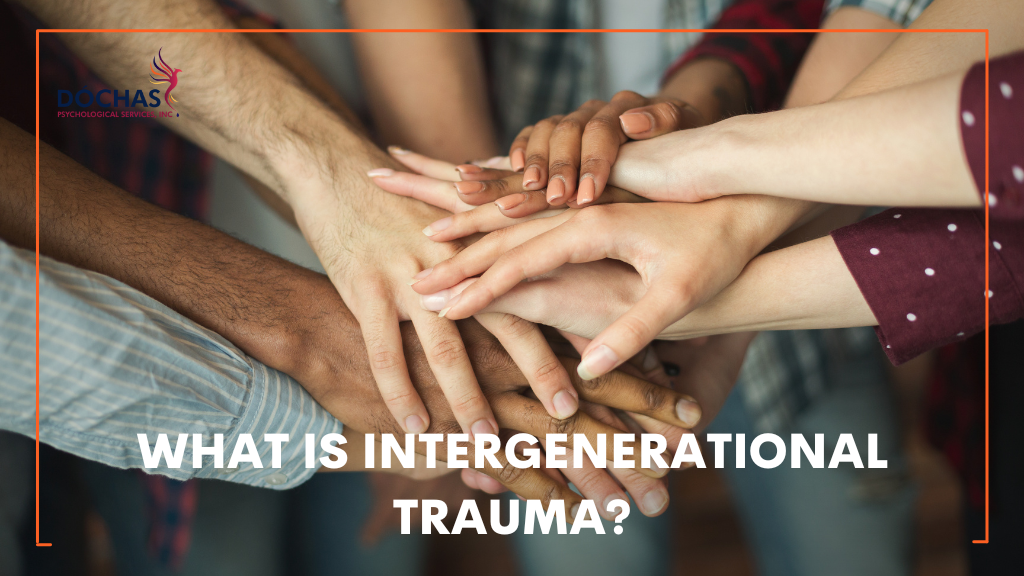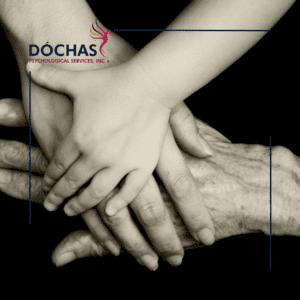“They have their dad’s smile and she has her grandmother’s eyes.” How often do most of us hear this in our conversations with families? But we often inherit more than just the way we look from our parents. It’s Pooja here on the Dóchas blog and I am honoured to talk with you about intergenerational trauma. While not discounting other cultures’ lived experiences or those who may not have a biological family in their immediate environment, the focus of the blog is on inherited family trauma.
What is Intergenerational Trauma?
Intergenerational Trauma is defined as trauma that is passed down from those who directly experienced the traumatic event(s) to subsequent generations. For instance, if a grandmother had to escape her hometown, some of those images, emotions, core beliefs and even physical body sensations could be present in the granddaughter.
This impact of trauma in families can feel like it complicates our experiences further, giving us an additional burden and responsibilities alongside the current lived experiences. Here are some ways to address this:
Speak to Someone
This would be my first go-to. If you feel you have unearthed or connected with any type of trauma, especially if it feels like it does not belong to you, I would advise you to explore this with a trauma-informed trained professional to discern what is yours versus what has been inherited. In this setting, you can be taught tools and resources on how to cope with this and can decide with your trained professional how to proceed.
Creating a Family Tree and Research
This step depends on access or availability of this knowledge, but if you have access, here’s what you can do. Look at relatives from the past 2-3 generations. Who was married, not married? Who had experienced adversity or trauma, abuse, any losses or deaths, miscarriages or sudden deaths? Who was incarcerated, or betrayals within the family, accidents, financial gains or losses?
You can consider social-political events going on at those times and what their core beliefs or messages could have been. For example, scarcity fears, fears of being persecuted or judged, difficulty trusting in relationships and difficulty grieving experiences. Consider the resilience and strength ancestors may have had to cultivate to survive.
It Did Not Start With You but It Can End With You
Healing can begin by deciding what you’d like to keep and what you would like to return. You can recognize what isn’t yours and the impact that this may have had on your ancestors at their time. This can help separate and return it to them. This could be a type of exercise that you can do (e.g. if they are living, connecting with them; or if they are not accessible or available, their photo or an item that represents them and write/read a letter to them). This can be an emotional process.
I hope I was able to help you understand the concept of Intergenerational Trauma. If you require assistance in your healing journey, there is no shame in seeking support. I encourage you to reach out and ask us how we can help. You can reach out to us here by calling us at 780 446 0300 or emailing info@dochaspsychologicalservices.com.
About Dóchas Psychological
Dóchas Psychological Services is a well-established and trusted therapy clinic located in Spruce Grove, Alberta. At Dóchas we value the idea that everyone deserves a safe space. Through connection and education, our team works hard to build a trustworthy relationship with each of our clients. It is our goal to create a community for our clients to feel like they belong.
Disclaimer
Information provided through Dóchas Psychological Services blogs or vlogs is meant for educational purposes only. They are NOT medical or mental health advice. You can read more about our disclaimer here.



